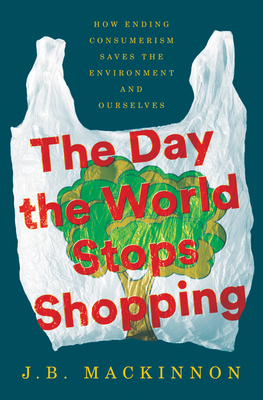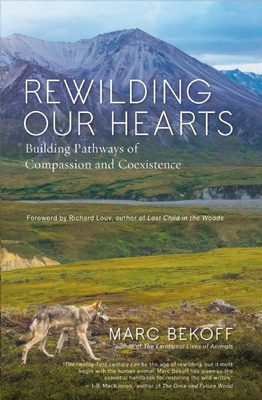J.B. MacKinnon explains how ending overconsumption can save our planet.
KEY POINTS
- A new book, using information from vastly different cultures, shows the positive effects of living with less.
- In America alone, we burn the earth’s resources five times faster than they can be regenerated.
- “We can’t stop shopping. And yet we must. This is the consumer dilemma.”
I first became familiar with the writing of acclaimed journalist J.B. MacKinnon when I read his outstanding book The Once and Future World: Nature As It Was, As It Is, As It Could Be as I was completing my own research.1 He and I agreed that humans had to rewild themselves in what he called the “age of rewilding” to reconnect with nature and to stop our destructive ways. Now, with the publication of his new book The Day the World Stops Shopping: How Ending Consumerism Saves the Environment and Ourselves, MacKinnon convincingly argues that we must change our relationships with nature and with ourselves. To solve the consumer dilemma—the economy says we need to consume more but the planet says we consume too much—we must radically alter how we acquire things.2
I thoroughly enjoyed The Day the World Stops Shopping and I’m pleased that MacKinnon could take the time to answer a few questions about his imaginative, inspiring, and optimistic book.
Why did you write The Day the World Stops Shopping?
It was clear to me that we’re trapped in a consumer dilemma. On the one hand, if we want to save the planet, we need to stop buying so much stuff. On the other hand, every time consumer spending slows down, it’s an economic disaster. I decided the best way to see past that dilemma was to write a book-length thought experiment about what would really happen if we stopped shopping so much—and we didn’t start again.
How does your book relate to your background and general areas of interest?
I mainly write about nature, wildlife, and the environment, and the biggest threat to all of them is consumerism. Most people still think that the world’s endlessly growing population of people is the ultimate root of our environmental crises. That’s no longer true. Since the turn of the millennium, overconsumption—not overpopulation—has been our biggest problem. How much each one of us consumes now matters more than how many of us there are.
Who is your intended audience?
Anyone who worries that we can’t keep consuming more and more without putting the planet in peril, or who wonders—at least at times—whether consuming more and more is really improving our well-being. That adds up to a lot of people. My hope is that The Day the World Stops Shopping will move consumerism back toward the center of the discussion around environmental, psychological, and social health because that’s exactly where it belongs.
What are some of the topics you weave into the text and what are some of your major messages?
The book looks at what would happen—to our environment, our products, our economy, our selves—if we suddenly started consuming less. It isn’t science fiction, though. I’ve grounded everything in real-life stories. I traveled the world, visiting places like the last county in America that still bans shopping on Sundays, and an island in Japan that hasn’t seen economic growth since the 1990s. I talked to people who’ve practiced simple living for decades, and a Bangladeshi CEO who runs an apparel factory and wants us all to buy fewer, better-made clothes instead of fast fashion. And so on.
What I discovered is that we really can slow down our consumption without triggering anything like the collapse of civilization. In many ways, in fact, it can offer us a better life: more free time, more meaningful work, an abundant natural world, and products that are made to last.
How does your book differ from others that are concerned with some of the same general topics?
There are a lot of books that encourage us, as individuals, to live more simply. My book goes a step farther and asks, “What would happen if we all lived more simply?” That’s a much more important and challenging issue because that’s really what needs to happen.
How would a lower-consuming society change our relationship with other animals?
The pandemic shone a lot of light on this question. At a big-picture level, we saw how the slowdown in human activity left behind spaces that wildlife quickly filled, from alligators on Caribbean beaches to elephants returning to old travel routes in India. We also saw a rapid decline in the pollution, emissions, deforestation, and development that degrade and destroy wild animals’ homes. At a personal level, the pandemic led a lot of people to focus more on the kinds of things that bring us real psychological satisfaction—including relationships with nature and our animal companions. If we reorganize society around lower consumption, we can enjoy many of these same benefits, but without the suffering of the past year and a half.
Is there anything else you’d like to tell readers?
I’m a consumer, too, and I didn’t write this book to make anyone feel judged about what they buy. Coming out of the pandemic, I think we’re all looking forward to a little more consumer culture in our lives. The current prediction, though, is that we’re headed for a Roaring Twenties-style shopping binge, sending consumption to record levels. I suspect that’s going to shock a lot of people, and we’re going to have serious second thoughts about getting back to “normal.” It’s a great opportunity to debate what we want the future of consumption to look like.
References
Notes
By Marc Bekoff with J.B. MacKinnon.
1) J.B. MacKinnon is the author or co-author of four books, among them The Once and Future World, which won the Green Prize for Sustainable Literature, and The 100-Mile Diet, a bestseller widely recognized as a catalyst of the local foods movement. His award-winning writing appears in publications including the New Yorker, National Geographic, and Reader’s Digest. Mackinnon is an adjunct professor of journalism at the University of British Columbia and also works in the field of interactive documentaries. He lives in Vancouver, BC.
2) The book’s description reads: Consuming less is our best strategy for saving the planet—but can we do it? In this thoughtful and surprisingly optimistic book, journalist J.B. MacKinnon investigates how we may achieve a world without shopping. We can’t stop shopping. And yet we must. This is the consumer dilemma. The economy says we must always consume more: even the slightest drop in spending leads to widespread unemployment, bankruptcy, and home foreclosure. The planet says we consume too much: in America, we burn the earth’s resources at a rate five times faster than it can regenerate. And despite efforts to “green” our consumption—by recycling, increasing energy efficiency, or using solar power—we have yet to see a decline in global carbon emissions. Addressing this paradox head-on, acclaimed journalist J. B. MacKinnon asks, What would really happen if we simply stopped shopping? Is there a way to reduce our consumption to earth-saving levels without triggering economic collapse? At first this question took him around the world, seeking answers from America’s big-box stores to the hunter-gatherer cultures of Namibia to communities in Ecuador that consume at an exactly sustainable rate. Then the thought experiment came shockingly true: the coronavirus brought shopping to a halt, and MacKinnon’s ideas were tested in real time. Drawing from experts in fields ranging from climate change to economics, MacKinnon investigates how living with less would change our planet, our society, and ourselves. Along the way, he reveals just how much we stand to gain: An investment in our physical and emotional wellness. The pleasure of caring for our possessions. Closer relationships with our natural world and one another. Imaginative and inspiring, The Day the World Stops Shopping will embolden you to envision another way.
This post was first published at Psychology Today and reposted here with permission of the author.




